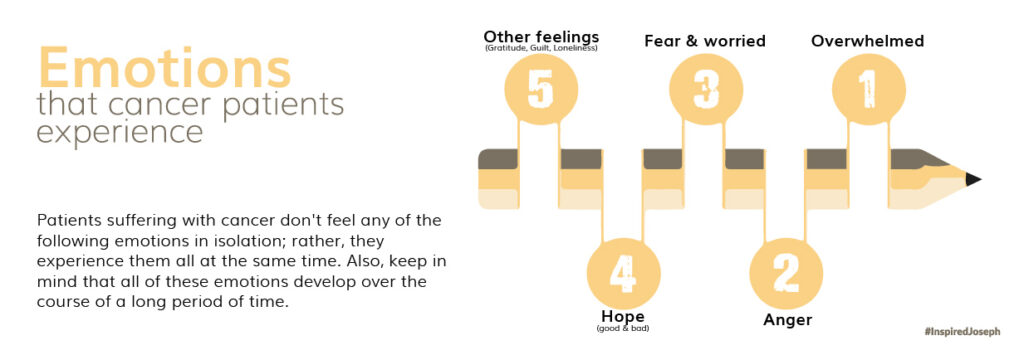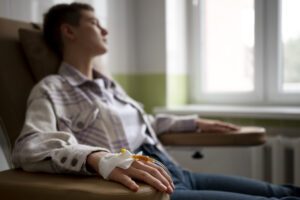Deeper insight into what cancer patients feel
Unless you are one of them, you will never understand what they are going through.
Emotions, Feelings in Cancer patients
Cancer not only impacts your physical health but also has the potential to stir up a wide variety of emotions that you are not used to coping with it.
This cancer impact can also make your feelings seem more vital. They might change every day, every hour, or even every minute. These fluctuations of emotions exist regardless of whether you are presently receiving treatment, have just completed treatment, or are a friend or family member of someone who is. All of these emotions are perfectly natural.
How you think about and deal with cancer is often affected belongs the values you learned as a child. For instance, there are people who; Believe they need to put up a brave front to protect the people they care about. or some may Seek support and talk to loved ones or other people who have survived cancer for advice, and others might Make an effort to seek the assistance of counselors and another mental health specialist to help them cope and get through hard times.
No matter what you choose, the most critical thing is to act in a way that is true to who you are and avoid comparing yourself to others. Some of your close friends and family members may have similar feelings. If you feel comfortable, you can tell them this.

Cancer may be the one starting the fight, but I'll be the one ending it.
(Joseph L. Wong)

I am a cancer survivor The deeper insight of a cancer patient
Cancer patients don’t experience any of the following feelings in isolation, but rather they feel them all at once. Also, consider that all of these feelings occur over a long period of time.
- Overwhelmed
Once they learn that they have cancer, they would feel as if their life is out of control. (Going to live-die, how would it affect their lives, what are the treatments, financial issues, loss, feels helpless & lonely.
- Anger
Fear, panic, frustration, anxiety, helplessness, blaming, the WHY
- Fear & Worried
Death, family, financial, medical, a burden
- Hope (Positive & Negative)
- The good side Leads to inspiring others, righting their wrongs, appreciating life, grasping every opportunity, being grateful, proud, and so on.
- The bad side is Sadness, Depression, Stress, and Anxiety
- Other Mixed Feelings
- Gratitude
- Guilt
- Loneliness

The deeper insight of a cancer patient Overwhelmed
This new information may cause us to experience a wide range of emotions, which is a widespread side effect of cancer. Many use the metaphor of being on an emotional roller coaster to describe this experience. A diagnosis of cancer causes a variety of emotions in each individual. Therefore, it is difficult to determine how fast or quickly someone will adapt to their circumstances. How a person responds and adjusts to living with cancer often relies on how they respond to previous challenges and crises. Within a relatively short time, a newly diagnosed patient may experience a wide range of emotions, including shock, fear, denial, rage, guilt, worry, depression, stress, isolation, loneliness, sorrow, and the list continues. It is possible that all of these feelings may arise at once or that they will occur in phases during the treatment process.
It is common to feel as if your life is falling to pieces when you first find out that you have cancer for the first time. This may be due to the following:
- You wonder if you’ll make it.
- Doctor appointments and treatments interrupt your daily routine.
- People talk to you using medical words which you are not familiar with.
- You feel like you’re not able to do the things you like.
- You are feeling powerless and alone.
- You are feeling vulnerable and isolated.
Even though you get the impression that you have no say in the situation, there are methods for you to assert your control. First, it might be beneficial to understand as much as you can about your cancer and its treatment. The more information you have, the more control you’ll feel over the situation. Talk to your physician about your concerns, and don’t be hesitant to admit when you don’t understand anything.
Some individuals find that keeping themselves active makes them feel better overall. Participate in hobbies such as reading, doing crafts, playing music, or learning something new if you find that you have the energy for them, then do so.

The deeper insight of a cancer patient Anger
It is natural to feel furious with the illness and wonder, “why me?” after being diagnosed with cancer. It’s also normal to feel resentful or angry at those trying to help you, such as doctors, healthy friends, or even family members. And if you’re religious, you may even feel furious against God.
Sometimes, instead of expressing other feelings, such as fear or sadness, individuals choose to show their anger instead.
Many of us learn as children that it’s wrong to show anger. However, rage is a common reaction to being diagnosed with cancer. You don’t have to act like everything is fine if it’s not. You might want to tell your friends and family that it’s not their fault if you get angry or moody sometimes.
Anger is sometimes the result of feelings that are difficult to express. Common examples are:
- Fear
- Panic
- Frustration
- Anxiety
- Helplessness
Again, you shouldn’t suppress your anger or try to act as if everything is OK. Keeping it inside of you is not suitable for your health. Instead, discuss the issue of your rage with your close friends and relatives. You might also ask your primary care physician to recommend a counselor. Also, keep in mind that anger is a valuable emotion since it has the potential to push you to take action.

The deeper insight of a cancer patient Fear and worries
A cancer diagnosis may be devastating. There may be moments when you feel you have no say in the direction your life is taking and no idea what the future holds. This is particularly true just after you’ve received the diagnosis, but it’s normal for these emotions to fluctuate during your treatment and beyond. Finding out that you have cancer is a terrifying experience. You could be anxious or concerned about the following events:
- being in agony, whether as a result of the illness itself or the treatment for it
- sustaining your job
- experiencing side effects such as feeling ill or appearing different as an outcome of your treatment
- ensuring the well-being of one’s family
- dying
- paying your expenses
Some concerns people have about cancer are based on myths, rumors, or incorrect information. Being well-informed may often be of benefit in overcoming anxieties and worries. Most individuals feel much better when they know what’s going on. Many individuals find that their anxiety and concern subside after they better understand cancer and its treatment. After settling into a therapy program, you may also experience a greater sense of control. Gain knowledge about your cancer and become familiar with what you can do to take an active role in your treatment. Some research even suggests that individuals well-informed about their disease and treatment are more likely to stay to their treatment plans and recover from cancer more rapidly than those who are not well-informed.

The deeper insight of a cancer patient Hope
Hope is the belief that something will occur. Some individuals find it easier to remain optimistic; it helps them cope with the current difficulties. But it may be difficult to find hope in a difficult event. And that is OK. You are not obliged to appear to feel a certain way if you do not.
Many cancer patients and their loved ones place a high value on hope, but keeping a balance between realistic and false optimism is crucial. Having a realistic view of the future enables you to make more informed choices about your treatment and any long-term goals you may have.
When individuals finally come to terms with cancer, they typically have a renewed sense of optimism. Some positive outcomes seem possible. Millions of cancer survivors are out there. Your chances of getting cancer and surviving it are better than ever. And even while receiving treatment, individuals with cancer may still enjoy full and active lives.
According to some medical professionals, hope may help your body fight cancer. For this reason, researchers are looking into whether or not maintaining a positive view and attitude improves one’s mood. Some strategies for increasing optimism:
- Keep doing what you’ve always done and schedule your days accordingly.
- Because you’re battling cancer doesn’t mean you have to give up on your hobbies and interests.
- Because you’re battling cancer doesn’t mean you have to give up on your hobbies and interests.
- Look for things that give you hope. Consider writing them down or discussing them with others if that helps.
- Spend some time outdoors.
- Think about what you believe religiously or spiritually.
Hear the experiences of individuals with cancer yet still living full lives.
Sometimes, a person believes that their life is meaningless and that things will never improve. This is a typical example of hopelessness, which typically manifests itself in people who are discouraged, sad, or nervous in response to a startling occurrence. Permanent disability and death may be devastating for cancer patients, who may already feel helpless due to their illness.
Feelings of hopelessness are common among those going through tough circumstances or who have had bad experiences. Multiple pressures and losses may lead to feelings of being unable to cope, being trapped, being insecure, and having significant amounts of self-doubt. The individual may lack the motivation to take action in their best interests because they believe the obstacles are overwhelming or there are no practical answers.
A patient’s hopelessness may be compounded by living in isolation and lacking social support systems and resources. Poverty, homelessness, limited access to health care, and losing faith in God’s respect or trust in previous spiritual beliefs are also factors.

The deeper insight of a cancer patient Other mixed feelings
Stress and Anxiety
It is natural to be anxious about the many things that may change in your life due to your treatment and after that. Anxiety is characterized by excessive worrying, an inability to unwind, and a state of heightened tension. You might notice that:
- Your heart rate goes up.
- Your head hurts, or your muscles hurt.
- You don’t want to eat. That, or you eat more.
- You can experience diarrhea or a stomachache.
- As a result, you may have symptoms including trembling, weakness, or lightheadedness.
- Your chest and neck feel as if they are closing in on you.
- Your sleep habits are either too excessive or too inadequate.
- Focusing is difficult for you at the moment.
- Focusing is difficult for you at the moment.
Consult a medical professional if any of these symptoms persist or worsen. You should check to be sure that these symptoms aren’t a side effect of a medication or treatment, even if they are characteristic of stress. Do take note that the healing process might be slowed by stress.
Gratitude
For some, being diagnosed with cancer is a solid reminder to live their lives to the fullest. They have learned to appreciate the little things in life. They go someplace they’ve never gone. They complete tasks that they had previously begun but set aside. They socialize more often with loved ones. They fix relationships that were not a success once.
Finding happiness with cancer may be challenging, but it is possible. Find joy in the little things that put a smile on your face every day. A decent cup of coffee, time with children, or a meaningful conversation are all examples of such straightforward enjoyment.
You may also do activities that have more personal significance, such as spending time in nature or praying at a sacred location. What makes you happy? It might be anything from engaging in a favorite hobby to preparing a delicious dinner. Whatever you choose, embrace the things that offer you pleasure.
Depression and Sadness
Most cancer patients experience sadness. They feel like they’ve lost their health and the life that they were living before discovering they had the disease. You may continue to feel down even after your treatment is complete. It’s a normal reaction to having a major sickness. Processing and adjusting to the many upcoming changes may need some time.
When you are depressed, you may have little energy, feel exhausted, and lose your appetite. Some people find that their negative emotions subside or fade over time. But these feelings can get stronger for some. It’s frustrating that the negative emotions don’t ease and continue to be a burden. Depression might be the cause of this. Some individuals are unaware that depression is a diagnosable medical condition. Cancer treatment may have worsened this issue for certain patients by changing how the brain functions.
Guilt
If you’re feeling guilty about anything, please know that you’re not alone; many individuals with cancer have similar emotions. For example, you may feel like a burden on the people you care about or that you’re too responsible for their distress. Alternatively, you may feel guilty about the jealousy of other people’s health. Finally, you might even blame yourself for cancer if you think that things you did in your life could have caused it.
It would help if you always knew that you did nothing to deserve cancer. Expressing your emotions to another person might be pretty therapeutic. If you want to see a counselor or join a support group, tell your doctor.
Loneliness
Cancer patients often feel alone or far from other people. There are a few possible explanations for this:
- Friends can sometimes find it hard to deal with cancer, so they may not come to see you or call you.
- You might feel too sick to enjoy the things you used to like doing.
- It’s normal to feel alone in your struggles sometimes, even while surrounded by loved ones.
It’s also natural to have feelings of isolation after treatment. The attention and comfort you received from your medical staff may have been greatly missed. Many individuals feel as if their support system has been weakened and their needs are no longer being prioritized. Some people may still feel distant from others in their social circle. Some of them may assume that because treatment is completed, you’ll be feeling 100% again in no time. It’s possible that other people would want to help, but are unsure of how.
Find other sources of emotional stability. Engaging in conversation with or joining a support group for persons with cancer may be helpful. Or maybe having trust in a particular trusted friend, family member, counsellor, or religious or spiritual group member might help you feel more at ease. Do what feels right to you.
You're allowed to scream, you're allowed to cry, but do not give up!!

The deeper insight of a cancer patient Ways to Cope with Your Emotions
Talk About How You Feel
People have found that they can better let go of intense emotions like anger or sadness when they talk about them. Some people work through their feelings by talking to loved ones, others in similar situations, members of a support group, or a counselor. Even if you don’t want to talk about your cancer with your loved ones, you may still deal with your emotions by thinking about them or writing them down. Seeking a counselor would provide you with a confidential and secure place to discuss sensitive issues without fear of judgment through privileged communication.
Don’t blame yourself for having cancer
Some people think that something they did or didn’t do caused them to get cancer. However, researchers have yet to pinpoint a definitive explanation for why some people get cancer, and others do not. All human bodies are unique in their ways. Remember that anyone can get cancer.
When to Discuss Cancer
People may struggle to find the right words while trying to comfort someone with cancer. People who care about us often want to help but don’t know what to say or do. Asking them about their thoughts and feelings might put them at ease.
Don’t try to be happy if you’re not.
People often say they want to be able to give in to their feelings when they want to. You’re not the only one who acts happy when they’re not. This happens pretty often. Many of us pretend to be happy at some point, which may occur more often than we realize. Maybe we’re just having a bad day, but we don’t want to make those around us feel bad, so we put on a fake smile and act like everything is fine. We might feel sad sometimes but don’t want to bring other people down, which might be okay in the short term. Pretending to be happy for those around you is not wrong. It shows that you care about their happiness. But if you lie more frequently, it might become a negative or limiting habit. Think about the last time you tried to act happy when you weren’t. Helpful? But how did you feel? You felt worse pretending than not pretending. Pretending to be happy when you’re not won’t benefit anyone. Realize that the person you’re attempting to persuade doesn’t want you to be happy. In the long run, they’ll realize you’re just faking it. The individual may feel worse for not noticing sooner. They may think they’ve failed you and aren’t doing what you want. It will drain your vitality even if you seem happy to please others. This might cause unfavorable emotions. You wonder why others can’t see through your mask and aren’t helping you. You wish they’d see through your mask or that you didn’t have to pretend. You’re probably tired of putting up a front and want to be yourself. You might harm your mental health and relationships by faking happiness. It might seem like putting on a happy face will help your relationships and make the people around you feel better, but that’s not true. You’re not showing them how you feel or what you’ve been through, which will affect how you think and treat the people in your life.
Try to be as active as you can.
Leaving home and doing something may help take your mind off cancer and its anxieties. Exercise, like light yoga or stretching, can also help.
Focus on the Good
Frequently, this involves searching for the positive even in adversity or striving for optimism rather than pessimism. Spend as much time as you can thinking about your health and what you can do right now to improve your condition.
Think about what you can change.
According to some, organizing one’s life might be beneficial. Some aspects of your health care that are under your control include taking an active role, maintaining your appointments, and making positive adjustments to your lifestyle. In addition, making a plan for each day might help you feel more in charge. While it’s true that no one can eliminate negative ideas from their minds, many people report doing their best to focus on the bright sides of life rather than wallowing in worry.
Find ways to make yourself feel better.
It would be best if you made time to do whatever helps you relax. For example, when you feel anxious, you may find it helpful to try some techniques that were effective in the past, such as meditation, guided imagery, and relaxation exercises.
Find What Brings You Joy
You could enjoy activities like gardening, photography, reading, or making things you love. Or seek creative avenues such as painting, film, music, or dancing.

Scanxiety – Phases, Symptoms, and Coping with it

Reaching new levels of relaxation using guided imagery – for stress and anxiety

The Emotion Wheel: Everything to know

Coping with lung cancer

Deeper insight into what cancer patients feel
